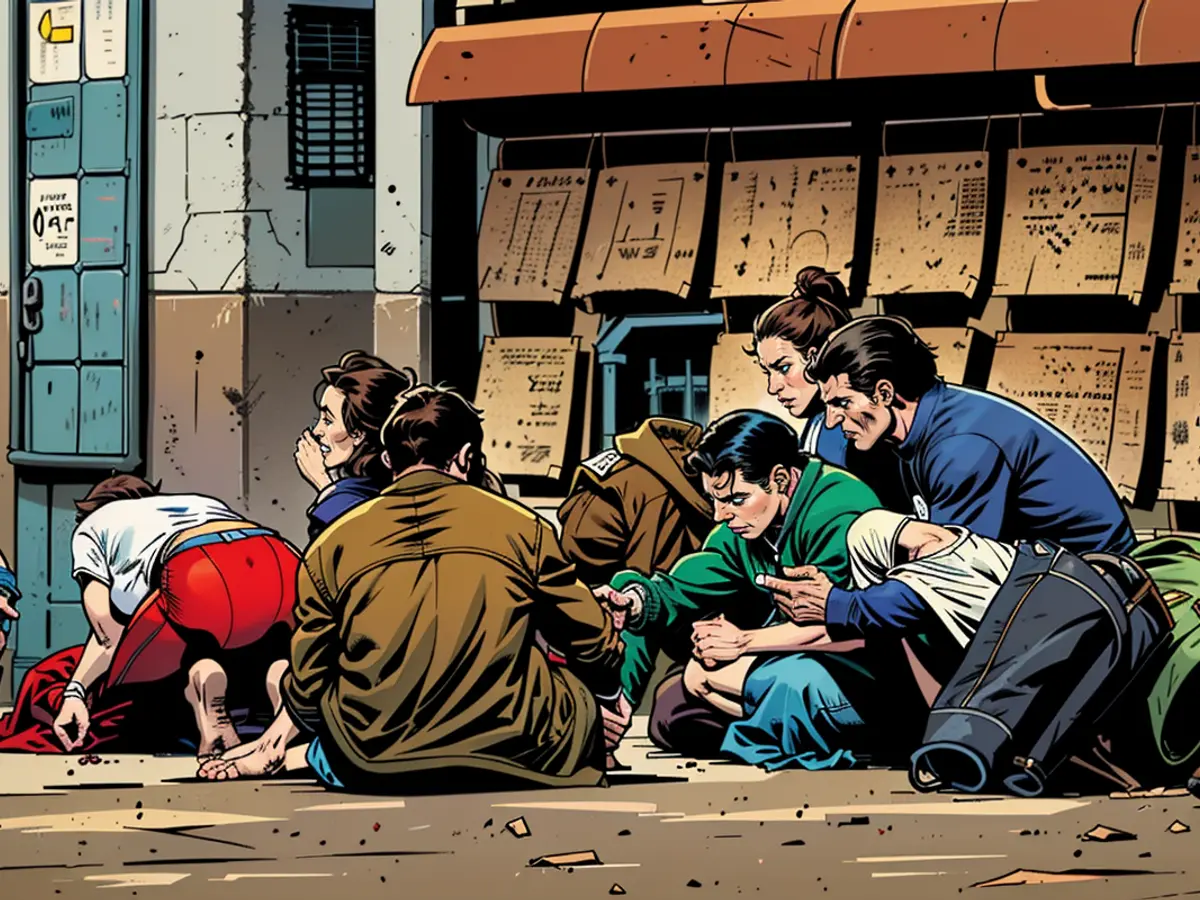British newspaper "The Sun" cautions about Frankfurt's "Zombieland"
Shortly before the European Championship games in Frankfurt, the British newspaper "The Sun" warned English fans to avoid the Bahnhofsviertel district. Drug users themselves express their fear of violent dealers and crack addicts and plead for help from the city.
Before Amar (name changed) dashes through the rain to the public urinal, he first has to pull his wet shoes over his holey socks. "I'm sorry, it's especially nasty outside today," says the man as he retreats to his refuge on Mosel Street in the Bahnhofsviertel. For months, he has been living in the entrance of a former hotel. On less than 2 square meters, he huddles with a friend on a piece of cardboard to sleep. In a corner lies a plastic bag with food, a broken suitcase serves as a pillow and closet.
It feels like a scene from "Zombieland," as "Sun" described the area around the station, with a clearly visible drug problem before the EM. It was called the "most dangerous slum in Germany," "filled with 5000 slobbering junkies and 300 dealers." Amar is one of the people who ended up in the Bahnhofsviertel. And he shares his experience of living there. He does it quietly, only after he has pulled the blanket over his head to create the illusion of privacy.
He has often been bothered or attacked by the group of junkies who are setting their crack pipes a few meters away. "I'm always afraid," says the Algerian man - and in that moment, a man under the influence of drugs pulls the blanket aside, giving Amar at least the illusion of privacy.
Since he arrived in Frankfurt in 2019, he has been living on the streets, reports the man who tries to maintain a semblance of dignity with a neat haircut and clean clothes. His body is marked by years of heroin consumption. In the past two years, it has become worse on the streets around the station. "There are constant attacks, brutal fights between addicts. More addicts are coming from elsewhere." And the drug that is currently circulating is making them more aggressive.
He hopes for help from the city: "I can shower and eat in the night café, but that's not enough to get off the street permanently," says Amar. He has no hope that anything will change in the run-up to the football EM - numerous international guests are expected to attend the games in Frankfurt. "Nobody here cares about us," he says and leaves it open who exactly he means.
The drug unit of the city of Frankfurt estimates that about 3,300 people use consumption rooms in the Bahnhofsviertel. Approximately 300 of them reside in the Bahnhofsviertel. Since 2012, crack has been the most widespread drug in the scene, followed by alcohol, cannabis, and heroin, says Anita Strecker from the Drug Unit. "Most addicts consume multiple substances." The police recorded around 8,500 drug offenses in Frankfurt last year, an increase of approximately 1,500 compared to 2022. Almost half of these drug-related crimes took place in the Bahnhofsviertel, according to a police spokesperson. There are also more frequent police checks: in addition to daily patrols, there is at least one major check per week.
"Here you'd get shot for a euro today, that wasn't so bad before," says a man in a leather jacket, sitting on the dirty steps of a house entrance with two women. All three have their crack pipes and a lighter on the asphalt in front of them. A police patrol drives past them casually, taking only a cursory glance. "It's still good that the cops are here," the man says. "Without them, it would be much worse here."
While the women struggle to form a coherent sentence, another man joins their conversation. "You could get shot for a euro today, that wasn't so bad before," he says, shaking his head. "I've been on drugs for more than twenty years, but the massive number of addicts and the unchanged amount of available drugs often lead to aggression."
A man with an umbrella approaches the group at the house entrance. A quick nod and two sentences later - a few banknotes and a portion of crack change hands. Then the three begin to prepare the drug for consumption. "I'll be gone for a minute," the man says and lights his crack pipe. A few minutes later, he can speak again. "We're not a pretty sight, I know - I used to have a normal life before this."
Drug Aid: "Change is Possible"
Stories like this have been familiar to Wolfgang Barth for years. The 63-year-old has been working with addicts for over 30 years and heads the Drug Aid (DND) in the Elbestraße. "The main problem is crack," explains Barth, who has experienced a "certain calm in the open drug scene" in the past two months. [Before][]{1}
With more police patrolling the streets, drug addicts feel safer from violent dealers and overall more relaxed. Meanwhile, the services provided by the Deutsche Notdienst (DND) are still widely sought after. According to Barth, their 20 overnight stays and day rest beds are consistently occupied, not only by regular attendees but also by those who have just arrived in Frankfurt for a short time. Despite the challenges, the well-being of the individuals is a top priority for Barth.
Though completely abstaining from drugs may be challenging for several individuals, many can lead a "semi-integrated life with significantly reduced consumption." This option is accessible to all. Transformations can always occur.

Read also:
The European Football Championship 2024 in Frankfurt amplifies concerns about drug-related crimes in the Bahnhofsviertel district, as acknowledged by the British newspaper "The Sun". Frankfurter Rathaus estimates that around 3,300 people use consumption rooms in the Bahnhofsviertel, with approximately 300 of them residing there.
In anticipation of the UEFA European Championship, international tourists are expected to flood Frankfurt. However, the drug unit warns of a significant increase in drug offenses in Frankfurt, with about 8,500 drug-related crimes recorded last year, an increase of approximately 1,500 compared to 2022. Almost half of these drug-related crimes took place in the Bahnhofsviertel.






